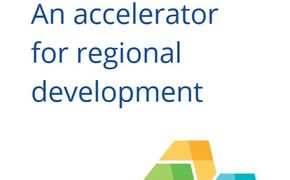On 23 February 2022, the Interreg Europe Policy Learning Platform held an online workshop on the topic of "Innovation capacities of SMEs".
Workshop recording
Agenda
- 00:00:00 Introduction of the topic and Policy Learning Platform by Luc Schmerber and Mart Veliste
- 00:07:20 Keynote speech by Francesca Spagnoli on "Improving the innovation capacities of SMEs: the support of Living Labs"
- 00:28:28 Keynote speech by Natalja Kleiner on "FZI House of Living Labs - Technology Platform for Innovation and Co-Creation"
- 00:56:50 Presentation by Maria Blomberg on "Stundars"
- 01:09:10 Presentation by Alexandra Beaudrouet on "Factory of the Future"
- 01:20:33 Presentation by Elisa Guidi on "Improving the innovation capacities of SMEs, innovation hubs and centers"
- 01:39:23 Presentation by Berghin Osman on "Centre for aquaculture consultancy services to assist fish farmers on legal and technical matters"
- 01:46:30 Presentation by Janette Hughes on "Improving innovation capacities for SMEs"
- 02:03:44 Presentation by Jörg Rodehutskors and Thorsten Brinkmann on "Innovation hubs and centers in high-tech industries: Innovation Campus Lemgo"
- 02:31:25 Observations by David Hope
- 02:46:57 Concluding presentation by Luc Schmerber and Mart Veliste
Key Learnings
Keynote 1: Improving the innovation capacities of SMEs: the support of Living Labs
Francesca Spagnoli (Head of Projects & Capacity Building, ENoLL - European Network of Living Labs) presented the European ENoLL initiatives, the concept of living labs and how they contribute to empower SMEs to innovate. Living labs refer to user-centred, open innovation ecosystems based on a systematic user co-creation approach, integrating research and innovation processes in real life communities and settings. In practice, living labs place the citizen at the centre of innovation and have thus shown an ability to better mould the opportunities offered by new ICT concepts and solutions to specific needs and aspirations of local contexts, cultures, and creative potentials.
Living Labs share some common characteristics: active user involvement, multi-stakeholder participation by implementing a multi-method approach in real life settings to co-create and orchestrate a series of open innovation activities in the 4-helix ecosystems formed by governments, companies, universities, research centers and citizens. Francesca provides also some details on the innovation process applied by Living Labs. She underlined the specific usefulness of the living lab approach in the context of smart cities development and showed some examples from the ENoLL network. In this context, Francesca Spagnoli mentioned that for many living labs there has been a move towards citizen engagement and what type of social value is being co-created in communities. This trend increases the importance of regional authorities in the living lab structures.
Keynote 2: FZI HOUSE OF LIVING LABS – Technology Platform for Innovation and Co-Creation
Natalja Kleiner (Department Manager of Innovation, Demonstration and Transfer (IDT) and Coordinator of the FZI House of Living Labs) presented the FZI Research Center for Information Technology with a focus on the House of Living Labs (HoLL). The HoLL is a key element of FZI’s mission to foster transfer of research to practice and combines the following elements: An innovative research environment for small and medium-sized companies on more than 2,000 m2; Cutting-edge hightech equipment and infrastructures with information and communication technologies, vehicles and many more; Participative research and development of experimental technologies in real-life scenarios; Seven Living Labs for cross-sectoral research, evaluation and development: Future mobility, industrial intelligence, security and law, service robotics, smart energy, smart home (AAL) and software innovations.
Following a short online tour of the HoLL, Natalja summarized the role of Holl as innovation driver for SMEs in the following dimensions:
- Inspiration (Demonstration of latest trends and developments, bringing together different players (Quadruple Helix Model), bi-directional inspiration through co-creation
- Knowledge (Bundling of interdisciplinary competencies from different application areas)
- Technology (Providing access to newest technology, without having to buy it)
- Test-before-Invest (Providing possibilities for testing and validation of products and services in real-life scenarios
- Network (Matchmaking of technology providers and technology users and initiating new cooperations)
Innovation hubs and centers in traditional sectors
The first thematic session was dedicated to innovation hubs and centers for traditional industries, including crafts. The discussion developed around four good practices: A connector of tradition and modernity (CRAFTS CODE), presented by Maria Blomberg from Stundars (Finland), “Factory of the future” in Nouvelle Aquitaine applied to Artistic Ceramic SMEs, (CLAY), presented by Alexandra Beaudrouet, Pôle Européen de la Céramique (France), Officina Creativa (CRAFTS CODE), presented by Elisa Guidi, ARTEX (Florence, Italy) and Centre for Aquaculture Consultancy Services to assist fish farmers on legal and technical matters (EXTRA-SMEs), presented by Berghin Osman, Bucharest-Ilfov Regional Development Agency (Romania).
What have we learned?
- Traditional businesses, including from the craft sector, require platforms to meet and engage with other businesses, the public in general and potential clients.
- Such places are important for different purposes: exchanging knowledge, learn about new techniques, motivate young people to engage into traditional trades or craftsmanship, get the opportunity to test new products and service with customers.
- Such places also contribute significantly to create social and cultural value in their local environment, as well as revitalising urban areas.
- Awareness raising is key: also traditional industries need to innovate, and innovation hubs can generate adequate stimulus to help businesses engage into innovation processes and invest into new technologies.
Innovation hubs and centers in high-tech industries
The second thematic session addressed the topic of innovation hubs and centers in high-tech industries. The discussion developed around two good practices: Digital Health and Care Innovation Centre (DHI) (ACSELL), presented by Janette Hughes from Digital Health and Care Innovation Centre (Scotland), and Innovation Campus Lemgo (Future Ecom), presented by Thorsten Brinkmann, GILDE Zentrum (Germany) and Jörg Rodehutskors, Innovation Campus Lemgo e.V. (Germany)
What have we learned?
- Innovation is not only for businesses who want to grow fast; the majority of businesses actually need to innovate in order to remain competitive on their markets and not run out of business. It is crucial to get this message out to as many businesses as possible. This is matter of mindset, not a matter of technology.
- Access to technology shall not be considered as an isolated issue in terms of innovation support. Most businesses do also need support in terms of business modelling, service innovation design, innovation management skills. There is a need for a convergence of innovation support services.
- Businesses do also have challenges in bringing their products more rapidly on the market. Support services that can help them testing the market readiness of their products, like living labs, are very valuable in this respect.
- Challenge- or demand-led innovation initiatives are powerful policy instruments, which can be used by policy makers, to stimulate innovation by providing a much-needed road to market. This is for instance especially relevant in complex markets such as health solutions, which require long development time for new products.
- Considering the above, multiple stakeholder joint initiatives are required to provide adequate innovation support. Innovation hubs are a possible answer to the needs identified and bring together different actors and support mechanism in one place, be it virtual or physical. Innovation hubs can cover the whole support chain, from access to research to access to market.
In addition to the insights provided in the workshop, the Interreg Europe Policy Learning Platform can help you address any policy challenges. Through matchmaking sessions and peer reviews we can provide you with experiences and in-depth knowledge from other regions that have successfully found solutions for the challenges you are experiencing. Curious about how these services work? Visit our expert support webpage and contact us.
Other Policy Learning Platform resources
- Policy Brief: “Vouchers for the competitiveness of SMEs”
- Policy Brief: “Operational approaches to efficient business support delivery”
- Policy Brief: “Industry 4.0”
- Story: “In search of new products, new markets or innovative ideas?”
- Story: “Fostering market uptake for innovative digital products and services”
- Story: “Smart societies: interregional cooperation boosts digitalisation in rural areas”
- Online Workshop: “Industry 4.0 and the SMEs digital transition: Episode 1”
- Online workshop: “Scaling up European SMEs”
Image credit: kenishirotie on Envato Elements









